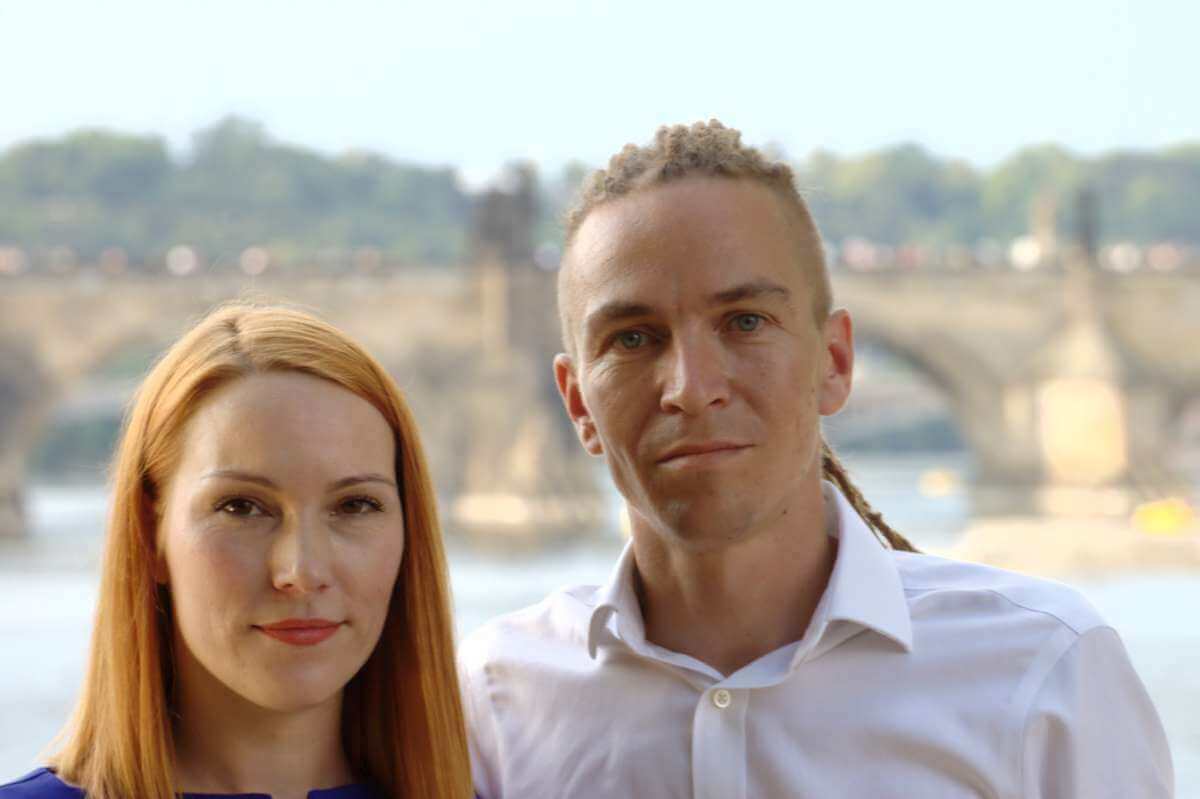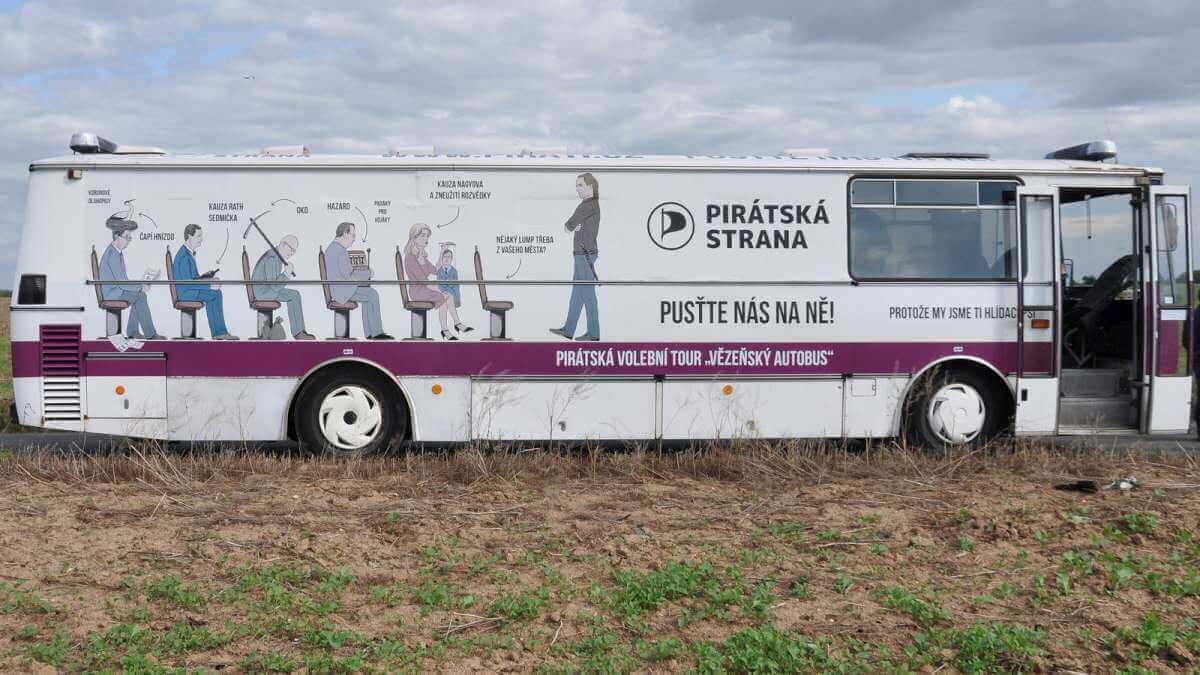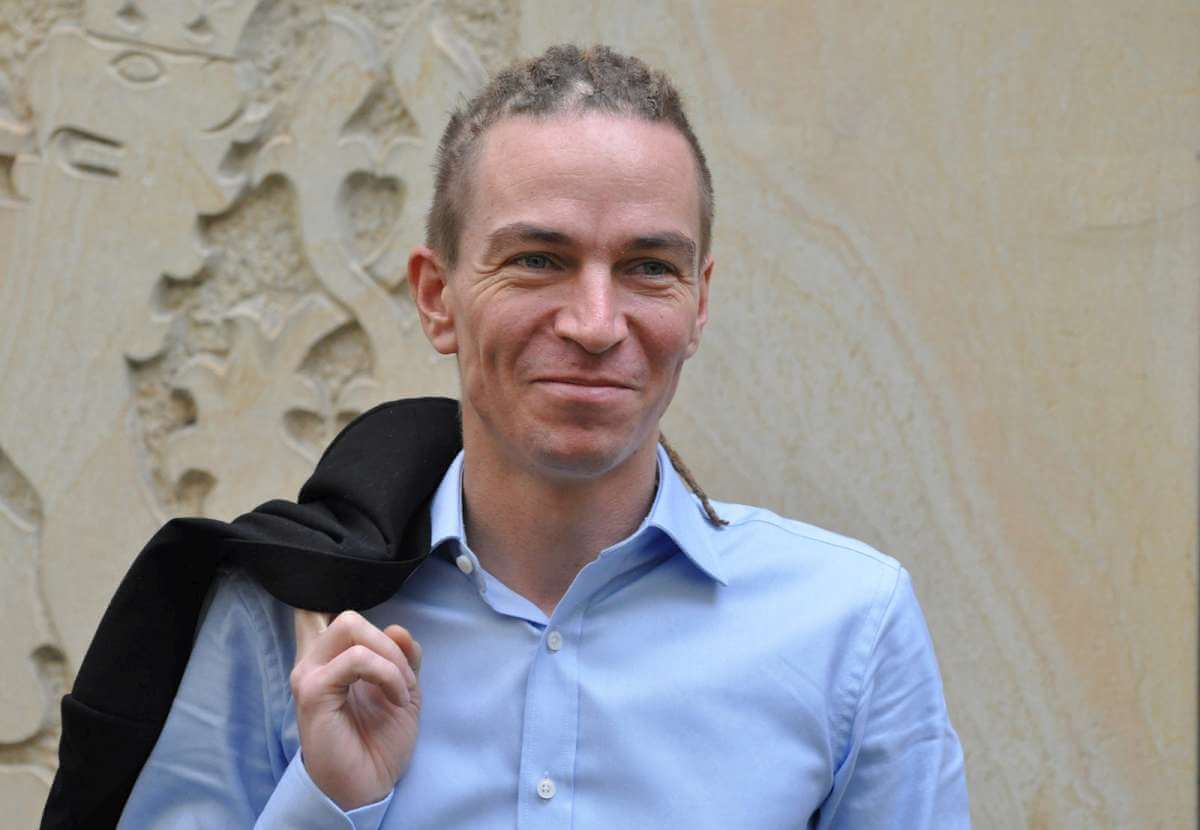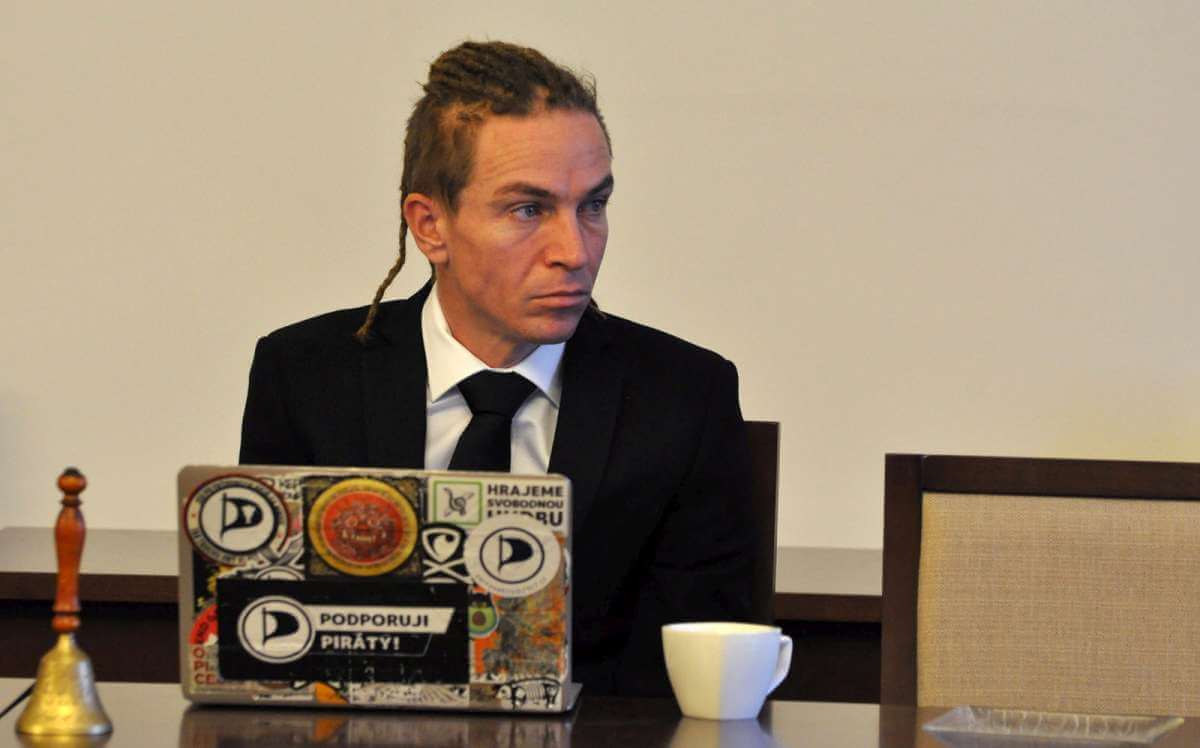Following the 2017 legislative election, the Pirate Party, with the 22 seats in the parliament, has become the third most powerful political force in the Czech Republic. Who are Czech Pirates and what are the problems they want to focus on? Read the interview with the Pirates leader Ivan Bartoš.
Ivan Bartoš, leader of the Czech Pirate Party: Can we make it half an hour, please?
Sławek Blich, Krytyka Polityczna: Duty calls?
No – my wife. We shared a Christmas gift – I have a tattoo to finish on my chest. I cannot be late today. By the way, did you know that Lydie, who is also a member of the Pirate Party, organized the Black Protest in Prague in defence of Polish women’s rights?
Our good friends from A2larm.cz have even covered it, yes.
This is exactly how we all started – we were activists, protesters who couldn’t stand the status quo.
I came to see you, because we don’t know whether you are good or a bad news for the left.
We achieved a historical success in the last parliamentary elections. We are now the third largest political force in the country. We have a few senators, 22 MPs, we have people in the regions as well as a mayor in Mariánské Lázne in western Czech Republic.
You puzzled a lot of commentators with this result. We knew that you were anti-establishment, liberal, that you encapsulate a generational change on the political scene. Oh, and that you produce the best clips in the entire Visegrad region, like the one in which you play the accordion and drive the bus:
We are not a populist party, though. Some of our critics argued that apparently we were aggressive in the electoral campaign. So we fact-checked it with a simple, post-electoral linguistic analysis that proved that the Pirates were the most reasonable, facts-using party.
And you know what? It also proved something much more interesting. Among the most frequently used words in our campaign were „future” and „equality”. Now, let’s look at the Christian Democrats. Guess what they used? „Fear”, „anger”. Other parties went even more evil. It’s the same thing all other populists did around Europe: in Germany, Austria, in the UK. Even the centrist parties in the Czech Republic, like the Social Democrats, used this aggressive rhetoric. And now they are surprised. Guess what? It’s them who made people vote for SPD and Mr Okamura.
Now you stormed through the doors of mainstream politics. But many commentators struggle with defining the Pirates politically. Why do you think is that?
Because they make a mistake and try to measure us in the same way they measure traditional politics. But I understand that. 8 years ago, we started a political party based on the example of the Swedish Pirates, but pretty soon we figured that the Swedish take on the matters of internet freedom and civil liberties alone just did not work for us.
Because?
The message we were delivering was targeting maybe 15% percent of the general population. And pretty soon we got all tangled up.
What do you mean?
It’s like a snowball effect – the Pirates are a social movement built around a group of a very concrete social and environmental circles. Under such circumstances, the Pirates on the left of the party influence the Pirates on the right all the time, discussing and deliberating. We got stuck in an ultimate feedback loop from the already persuaded group. Anytime we would try to make a step forward to reach new voters or just simplify our message as a party, we were blamed by our core supporters: you said B instead of an A, you used the wrong expression, you oversimplified…

It sounds all too familiar for a Polish left wing political editor, I can tell you that.
It was a disadvantage. And politics is complicated, you know? A thorough explanation of the solutions we propose to common problems is especially ineffective in the very short time-span people can devote to really listen to politicians and read their political programmes.
Nobody reads political programmes, let’s be honest.
„4 main reasons to vote for the Pirates” – that’s something you would read, wouldn’t you? So the first thing we decided to do as the Pirates was to simplify our message. We kept everything fundamental in the Pirate programme, but we converted it into a digestible and easy-to-understand form. We removed all hyperlinks. All of a sudden, our message became understandable for at least half of the population.
We are still a 100% democratic party based on the principle of participation and transparency.
In the campaign you played as a team, but had a strong and recognisable leader.
Today we are still a 100% democratic party based on the principle of participation and transparency. You can call me off in two weeks if I make a terrible mistake as a leader.
And how did you agree on what had to be simplified in your message, so that you could both persuade new voters as well as keep the old ones from shutting the door?
This is how we started our campaign – we involved a lot of people, friends of friends. They surveyed about 1500 people about the pros and cons of voting for the Pirates. Do people really know what Pirates advocate for?
So we took the results and mixed them with our core political beliefs in order to formulate a pretty simple communication goal: to introduce the Pirates as a democratic, liberal, rational party with a special focus on technology and honest about people’ social problems in the region.

So what kind of social problems do you want to address first and foremost?
When your washing machine breaks and you cannot afford to fix it, and all you can do is to go and borrow money from Home Credit, when you don’t have savings to actually afford basic things – that means something has gone wrong in your country. In the majority of post-communist countries this very basic freedom – we can depict it as the very bottom of the pyramid of needs – is still not sufficiently satisfied. I wouldn’t say that people are struggling in the Czech Republic, but incomes here are still really low, people have little savings, while tens of thousands of people are forcefully evicted from their homes.
Can you see why the Swedish Pirate’s copy-paste did not immediately work in the Czech Republic? How can you preach to the people about internet freedom or democracy, when their actual business is to make ends meet at the end of each month? It’s not that people in the regions are not interested in freedoms, philosophical or political issues, but I am convinced that progressive politics has to start with bringing basic security to the people and passing through the lower floors of the pyramid first.
Some leftist circles criticize your party for not having a coherent set of political beliefs. As Marie Heřmanová wrote for A2larm, some members of the Pirate Party are actually not far enough from Czech libertarian Petr Mach’s freewheeling views on the economy. Are you Petr Mach disguised in dreadlocks?
The libertarian Party of Free Citizens (Strana svobodných občanů) is just neoliberal nonsense. Pirates prefer cooperation against competition.
Fair enough, I’ll skip the libertarian line then.
I respect the guys at the A2larm, but I do not share the view that the traditional right-left division is the solution to modern problems. Unless you are dogmatic, there is no way you can believe you are always right.
We are not demagogues. We are a flexible party that can revoke its previous decisions based on information that was not accessible to us before. We don’t run a fake theatre for the public. We always take a liberal approach to the discussed topic and try to make the best possible decision. This is why we can accept the fact that big business is a part of society. Similarly, I don’t mind politicians meeting with lobbyists, as long as they make a record of it and reveal it to the public.

Do you do it yourselves?
Yes. As Pirates we publically share a record of all the meetings we hold with lobbyists and interest group representatives. This is also a fundamental task of my party: to give people maximum information so that they can make better decisions. We do this, because the only way you can fight the pathologies of “cowboy-style” capitalism or the influence of global corporations is to actually reveal how the system works.
In your post-electoral strategy document you propose a progressive tax, but only above 130 000 CZK. Which is a lot of money.
Because in reality what we have today is a degressive tax system. The more money you earn, the less taxes you pay. We are criticised from the left that we want to introduce a flat tax, but that’s not fair.
You don’t want a flat tax?
We want to simplify the system of paying taxes for all, including the poorest, and minimize duties that the taxpayer has towards the state. We are certainly not libertarian or neoliberal in our thinking about it.
So what are you?
We’re putting our ideals into practise through pragmatic solutions. We have both feet on the ground. As the Pirate Party, we are interested in allowing people to earn more, have a decent and increasing income. So what we are offering is actually a step to the left from the current situation.
So if neither left or right can save us, what will? Technology?
We are not saying that technology will save our lives, even though it can affect and change the environment around us in a good way. In this sense we are techno-optimists. But the Pirates do not live in some kind of Futurama – our agenda is a rational answer to the world around us. We are all already online. Even if you don’t use the system yourself, your healthcare or fiscal register is already there. That’s why it’s time to do e-government as it is supposed to be – a free and accessible service for the citizens.
After all a lot of us are to some extent good, ethical hackers, we are good at technology, so if we eventually won’t succeed as a party of tech-optimists, we will probably start destroying computers (laughs).

I will give you two reasons to destroy them now.
I am all ears.
AirBnb or Uber.
Being online and dealing with modern technology does not mean you are accepting all they bring along. Especially when we deal with the instability of the housing market or working conditions of taxi drivers.
But more importantly, I want to emphasise that the current fight with those platforms is also the wrong approach. If you really want to regulate them, you need two things: transparency and a powerful legislation. The right approach is to force those platforms to reveal all their financial and staff-related data. This is the only way you can control them. But the latter cannot be done by a single nation-state itself.
The fact is that a small country like the Czech Republic cannot singlehandedly face global corporations.
You need the EU. Let’s move on to discuss Europe’s place in the Pirate’s world. Anti-immigrant, right-wing populist parties have gained prominence in European politics in recent years. Central and Eastern Europe is leading in this race.
It will sound like a cliché, but for us European cooperation is the only way to keep peace in Europe – now and for the future. We are not euro-federalists, but unlike other Visegrad leaders we do not overplay the game of a nation-state interests either. We are interested in facts, and the fact is that a small country like the Czech Republic cannot singlehandedly face global corporations. Moreover, the legislation of a single country is too easily lobbied by corporations. A nation state also has no sufficient means to solve a massive global crisis, like the recent migration one.
The Czech Republic is one of the most Islamophobic societies in Europe. Aren’t you tempted to take political advantage of it, like they tend to do in Poland and Hungary?
We disagree with the abuse of the influx of refugees for political purposes and the spread of fear, moral panic and uncertainty in society. But we do want a rational solution to the real problem of mass migration, and for that to be possible we need a cooperative and reformed European Union.

Reformed in what way?
We strive for its fundamental reform towards more transparency and democratization. We would also like to see more major political decisions being made through the democratically elected European Parliament. And above all, we support the principle of subsidiarity, which is a key policy for the Pirates.
Can you elaborate?
It means that the decision-making process should not involve central EU institutions, as long as problems can be better addressed by national, regional or local structures. I am the leader of the Pirate Party, but it does not imply that I directly rule the North Moravian region. Our local structures do much better in knowing and trusting their candidates and running independent policy for their region. In Europe, many things can be done this way.
If Mr Orban or Kaczynski call you to offer a different political deal that goes by the name of Visegrad vs The EU, what do you say?
I’d say no.
Should the Czech Republic leave the Visegrad Four?
In the Pirate Party, we are progressive liberals and we respect personal freedoms, unlike ruling parties in Poland or Hungary.
What about Slovakia?
Fico at least played it smartly, he was the first one to say: „Hey Europe, we are the most liberal out of those four, so you can talk with us, let us rule and allow us to mediate with them”.
But as long as Visegrad is concerned, I respect the significance of cross-border cooperation between our countries in key areas, like trade and education, but it is nonetheless not a good position to be in for any country to team up with the Poles and Hungarians at the moment.
Meanwhile, you just elected a new prime minister – an oligarch accused of serious corruption. Mr Babiš is often compared to Donald Trump or Silvio Berlusconi. Rightly so?
When it comes to European affairs, Mr Babis is a big unknown because has changed his views multiple times. But he is so strong at the moment – through his PR and his own media – that he can easily get away with it. In the light of how I feel about politics, I would rather return to the old traditional days where corruption and a clear conflict of interest was considered to be something bad.

“Lidové noviny”, an influential newspaper belonging to Mr Babiš’s media empire, recently broke the story that the Pirate Party flirted with the radical Greek Marxist Yanis Varufakis. How is the love affair going?
I am especially proud of this article, because to get Diem25 on the front page of the conservative Lidovky is not an easy task.
Obviously we are not Marxists and I did my best to convey this to Mr Babiš’s journalists, but to no avail. Yet every honest liberal is against the governance of corporations, against lobbying and against the rise of any nationalist movement. This is why the common ground between us and Diem25 is something like 80%. Many people we respect signed up to their manifesto, including Julian Assange. If Diem25 is a common and transparent political platform for the greens, the left, and the liberals, we are ready to play the liberal role.
Do you really believe that any progressive force can achieve a significant electoral success in this difficult historical moment?
What I truly believe in is openness, education and not patronising others. In my liberal Pirate world I can accept the richness of the world. In the conservative world of Mr Orban and Mr Kaczyński, it would be much different: I would not be able to coexist with people with different opinions, I would be forced to shave or to go to church as others. I am a Christian myself, a Hussite Protestant. I studied theology and was baptised when I was 19. I only believe in one religious message: Jesus is love. It’s probably the same God Kaczyński worships, but I think I understand him better.
Ask him some time if the left in Poland will ever win an election again.
The left keeps failing also because it chooses to preach and to judge people. This is why the Greens failed in the Czech Republic. I don’t blame the conservatives. Perhaps this is why we succeeded? We accepted people’s fears and beliefs as they were, because you can only change them through openness, education and a fair discussion. I was in the regions, I travelled around the Czech Republic. When you go to the North Bohemian region, you will find people blaming the Roma community for all their social problems. Sure, I could have easily returned to Prague and gone to a television programme to say that those people are racist. But my mind is set on a bigger and more time-consuming task.
What’s that?
I really want them to change their minds one day.


